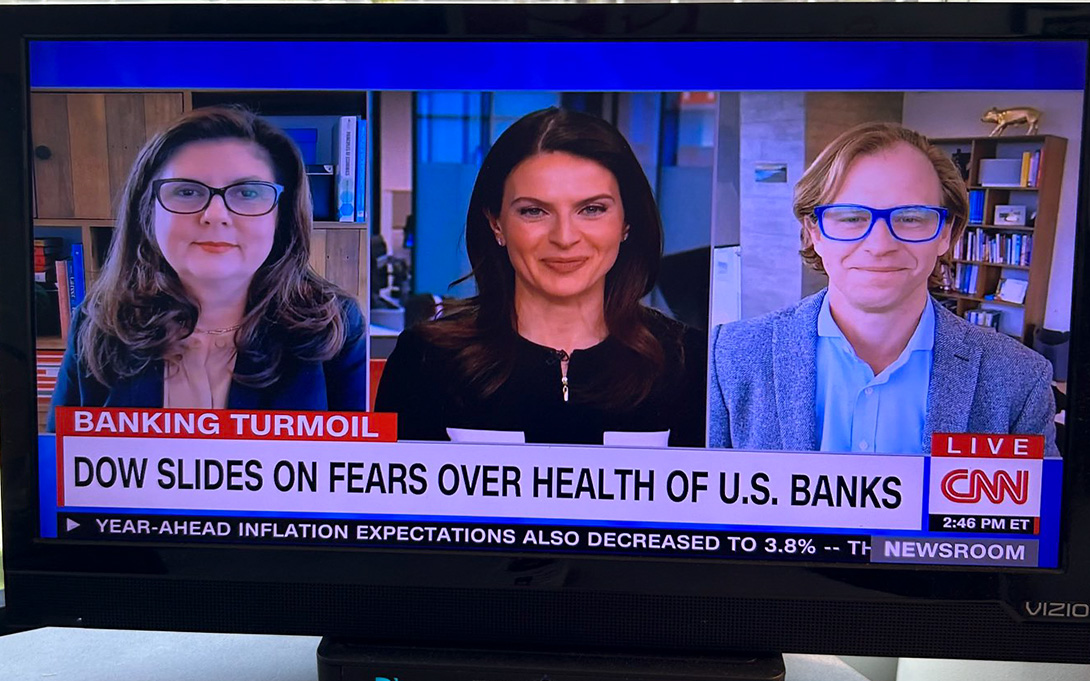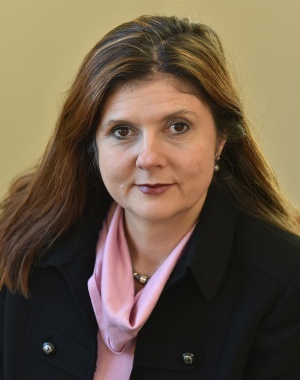
The collapse of the Silicon Valley Bank (SVB) set off alarms in the financial sector, with flashbacks to the 2008 financial crisis and increased worries about an impending recession. Betsey Stevenson and Justin Wolfers, both professors of public policy and economics, provided their expertise to multiple media outlets.
“The SVB gambled that interest rates would remain low, and they were wrong,” Wolfers told Folha de S. Paulo. “When they lost the bet, instead of admitting that they lost, they continued with the investments or doubled the bets, and let the losses increase.”
Stevenson discussed how the collapse happened on Amanpour.
“We have something where we deregulated, and when we deregulated, we saw excessive risk-taking. And with excessive risk-taking comes an increased threat of failure and that’s exactly what we saw in SVB,” she said. “There was mismanagement, excessive risk-taking. Finally, their clients got wind of it, and as soon as the clients got wind of it, you had a good old-fashioned bank run on your hands.”
As the government and financial sector deal with the aftermath of the collapse, fingers are being pointed at the Federal Reserve for raising interest rates. But, Stevenson explained why that’s not the case.
“There’s a real question as to whether it’s the Federal Reserve or central banks that have hurt the value of these investments by raising rates or whether it’s inflation that has reduced the value of the dollar,” she told BBC. “So, is it the Fed’s fault? The Fed has to fight inflation, that’s their mandate. The problem was inflation. And I think what’s happened is two decades of price stability — people got lazy and they thought, ‘We don’t really have inflation risk to worry about anymore.’ And the reality is that inflation risk hasn’t left us.”
Others are blaming “woke” and diversity issues for taking SVB’s attention away from its main purpose.
"I mean the real problem is that this is a bank that made really, really big bets. And sometimes when you make a bet, you lose. Why was a bank allowed to make really big bets rather than keeping some money in the vault? Because of a 2018 Trump-era weakening of our financial regulations,” Wolfers said on MSNBC. “So what do you do when you're caught with your pants down? You say, 'Hey, let's look that way.' The talking point here is ridiculous and absurd."
Both Wolfers and Stevenson point to the 2018 legislation that lightened some banking regulations.
“The simple version of the business model of these guys is they took deposits, and they went to the casino. Heads, they win a ton of money, tails, the FDIC comes in with government money and the government pays, not them,” Wolfers said on In the Bubble. “Now, who allowed them to go to the casino? In 2018, the Trump administration decides to weaken some of our laws around how much these guys are allowed to bet.”
“The head of SVB was the one who lobbied to get those requirements that their bank be able to pass a stress test removed in 2018,” Stevenson told ABC Australia. “He got them removed, they couldn't pass the stress test, guess what happened? They failed.”
Although many are worried about possible ripple effects from the SVB collapse, Wolfers concluded that as long as people continue to trust the banking system, other sectors shouldn’t be impacted.
"President Biden didn't just say that the banks are safe. He also said that all of the depositors from those two banks that went south will get all of their money back. And the implicit message he gave, therefore, was that if any other banks were to go south, everyone gets their money back,” Wolfers said to CNN. “Now the important thing to realize is that promise in itself should be enough to prevent a bank run. Why is that? Bank runs occur when everyone tries to get all of their money out all at once because they're worried there's no money left in the vault. Biden promised that there would be money left in the vault, therefore there will be no more bank runs."
“The thing about small banks is they’re small. The economy’s big. All of this is occurring in one small part of the economy,” Wolfers explained on The Investopedia Express with Caleb Silver. “For most, this has been a bunch of headlines with no bite. This is not 2008 again. 2008 was Wall Street crumbling. This so far, and I’m optimistic it remains that way, is very confined to, at the moment, one or two banks, plausibly a handful of banks, but very few of the dollars that make our economy.”
Read and hear about the SVB collapse from Stevenson and Wolfers:
- Quick US response will prevent financial system meltdown: economist, Folha de S. Paulo, March 15, 2023
- The collapse of SVB and the 'age of easy money', Amanpour, March 15, 2023
- Credit Suisse rocked as banking fallout continues, BBC, March 16, 2023
- Conservatives blame 'woke' & 'diversity' issues for SVB failure, MSNBC, March 13, 2023
- Could Your Bank Fail?, In the Bubble, March 17, 2023
- Credit Suisse and SVB banking crises are 'not a repeat of 2008', ABC Australia, March 16, 2023
- Regional banks' stocks tumble despite assurances from Biden, CNN, March 13, 2023
- Looking at the Glass Half-Full as the Fed Meets on Rates, The Investopedia Express with Caleb Silver, March 20, 2023

